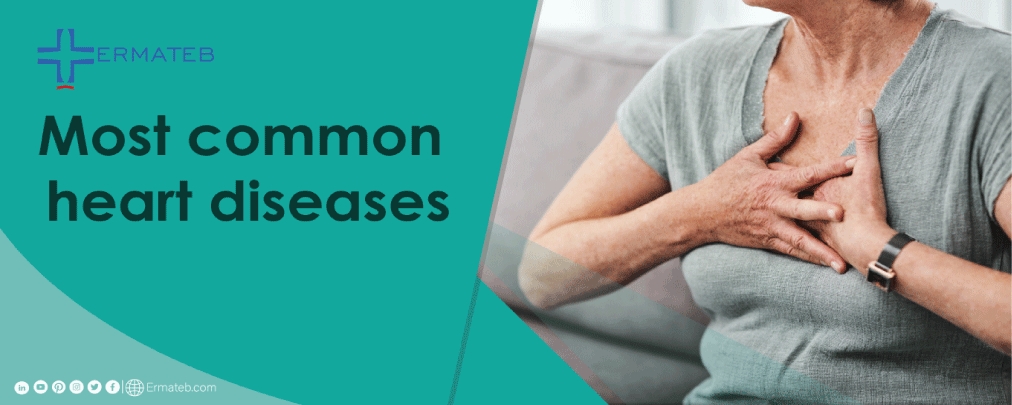
Heart diseases include about 630000 deaths only in United states regions annually. It means every one minute one person dies because of cardiovascular disease. The statics show a range of one heart attack every 40 seconds. The heart is one of the most vital organs which has a complex role to keep us alive. Due to these complex roles, there are many types of cardiovascular diseases. In this article, we try to introduce you to some of the most common heart diseases.
You can read them and then if you had any questions which were not answered in the text ask our professional experts in Ermateb's group. They try to answer all of your questions as soon as possible.
All birth defects that can be ranged from mild like a small hole in the heart septum to severe conditions are called congenital heart diseases. Most of these conditions are treated with surgeries. In most patients, doctors can diagnose congenital problems during pregnancy. As congenital heart diseases range from mild to severe, in some of the patients there are no symptoms till adulthood and the other group may not have any symptoms till the end of their life. Congenital heart diseases can happen in different parts of the heart like:
_ heart valve defects: the time that heart valves are too narrow or closed
_ bad connections in blood vessels: the vessels may not carry any blood or even they don't carry the blood to the right parts of the body
_ heart muscle problems: the condition in which heart muscle is not able to pump the blood efficiently enough
There are specific vessels around the heart which help the heart get enough blood supply for pumping blood and working effectively. The condition in which coronary arteries become too narrow and lose their function in supplying blood and oxygen to the heart muscle is called coronary artery disease.
This condition mostly happens due to a build-up of cholesterol or sometimes other wasting products on the artery walls. This cholesterol makes hard plaque that can obstruct normal blood flow in coronary arteries and this is so serious and cause debilitating health problems. Sometimes plaque causes breaking off or rupture and then platelets start to repair that area by clustering around the ruptured location. This happening can block the arteries and can lead to a heart attack.
Heart function is dependent on electrical impulses. Arrhythmia develops when heart electrical nodes are unable to regulate normal impulses. In this condition, heartbeats are faster or slower than normal. Electrical nodes have a specific role in heartbeat coordination.
In some patients, arrhythmias are very severe and can be life-threatening. Although, in more severe cases, heart arrhythmia may require urgent medical attention if the patient has other diseases that could exacerbate their condition.
As it can be guessed from the name this condition happens when the pulmonary valve is too narrow and rigid that can not support normal blood flow. In pulmonary stenosis, the heart starts a compensatory function. The right ventricle is responsible to work harder to be able for ejecting blood from a narrow pulmonary valve. This hard-working can cause thickening of the heart muscle and it is called hypertrophy of the right ventricle. Right ventricle hypertrophy doesn’t pose much danger but is an indication that it’s time for a specialist to intervene.
It's a general term for all types of diseases of the heart muscle. It has different types when heart chambers become stretched, thickened, or stiff. As everyone knows the heart muscle is responsible for heart contractions and in cardiomyopathies heart is not able to pump blood all around the body.
Be careful that abnormal muscle should not be caused by blocked arteries in the heart (coronary artery disease), high blood pressure (hypertension), disease of the heart valves (valvular disease), or congenital heart disease.
Most types of cardiomyopathy are inherited and are seen in children and younger people.
Dilated cardiomyopathy.
Hypertrophic cardiomyopathy.
Restrictive cardiomyopathy.
Arrhythmogenic right ventricular dysplasia.
Unclassified cardiomyopathy
Symptoms of cardiomyopathies are various.
There might be no signs or symptoms in the early stages of cardiomyopathy. But as the condition advances, signs and symptoms usually appear, symptoms like:
Breathlessness with activity or even at rest, Swelling of the legs or ankles and feet, Bloating of the abdomen due to fluid buildup, Cough while lying down, Difficulty with lying flat during sleep, Fatigue, Heartbeats that feel rapid or pounding or fluttering, Chest discomfort or pressure, dizziness, lightheadedness, and fainting.
_Age. Growing older increases your risk of damaged and narrowed arteries and a weakened or thickened heart muscle.
_Sex. Men are generally at greater risk of heart disease.
_Family history.
_Smoking.
_Poor diet.
_High blood pressure.
_High blood cholesterol levels.
_Diabetes.
You can also read about other details of heart diseases and surgeries on Ermateb’s website. Ermateb is a perfect medical tourism group that tries to provide all of the patient’s necessities. Ask our perfect experts who try to answer all your questions as soon as possible.